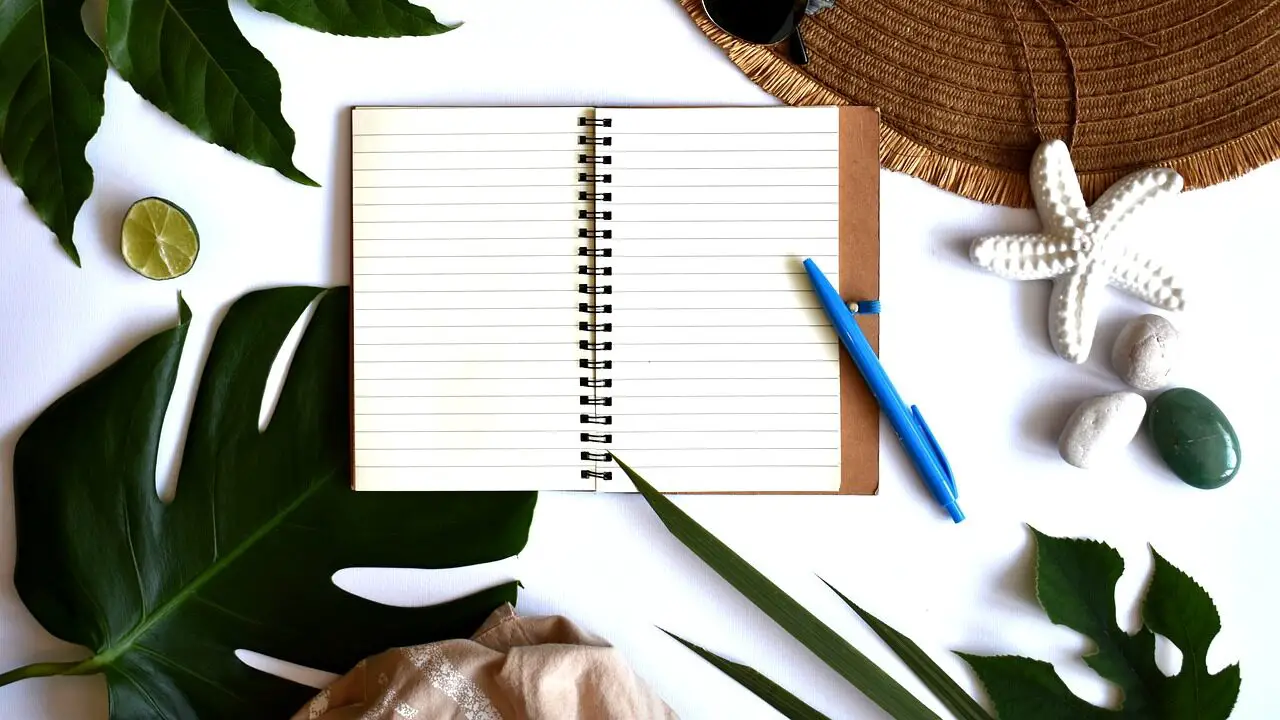Journal writing is a very simple process of penning down our thoughts to declutter our minds and gain more clarity. But people always seem to overcomplicate it. This guide would take you step-by-step on ‘How you can start a journal practice and stick with it’. After reading my last blog on ‘8 Powerful Benefits of Journaling to Transform Your Life‘, I hope you are convinced that journaling can be a life changing habit and you are ready to get started!
Journal writing, when it becomes a ritual for transformation, is not only life-changing but life-expanding.
– Jennifer Williamson
Before we begin, just relax and let go of any ideas about doing it the right way- because when it comes to journaling there is no such thing! Your journal is personal space for you to use however you see fit. After that, the only way to start journaling is to just begin. Grab a notebook, or your phone notes, or just a paper and write down what’s on your mind. I know, that first blank page will always be the scariest but once you have put ink to paper, there is no going back.

Maybe you are a beginner who wants to start journaling but can’t put a finger on where to start, maybe you’ve tried but you struggle with being consistent (that’s me), or maybe you just hate to write or don’t have the time for it? Here are a few steps that will help you to start your practice and maintain it. Remember, there is no hard and fast rules when it comes to journaling. So, feel free to experiment with them and see what works out the best for you.
1. Prepare
Get your goods. Firstly, choose the medium in which you’re comfortable to write. It could be your computer, an app on your phone, or old-fashioned pen and paper. It’s totally up to you. Apps and computers are more convenient (and probably something you’re already used to working on), but there’s some evidence that suggests that writing on paper might be a better option. Research tells that writing in cursive forces you to slow down and relieves stress. Your thoughts are abstract. Writing them on paper makes them more physical.
But what really matters here is that you have to keep up the habit. Typing or even using a journaling app on your phone might feel more convenient or comfortable for you, so if that medium fits your lifestyle best and helps you to maintain a routine, by all means, do what works for you.

Also, if you’re doing it the conventional way, try to opt for a simple notebook instead of a fancy one. Because if you’re someone who can be overly precious about things, you don’t want to make any mistakes or use bad handwriting in your fancy notebook, which eventually hampers your writing style. All you have to focus on is to be as real as possible while writing and not let secondary things bother you. There are various apps available online too that can ease your journaling practice. Personally, I like Notion. It has different template pages for all sorts of journaling/planning you want to do and it’s free for students. You can find more such options online.
If you’re serious about becoming a wealthy, powerful, sophisticated, healthy, influential, cultured, and unique individual, keep a journal. Don’t trust your memory.
– Jim Rohn
2. Commit to Journal Regularly
Next, you have to commit to this practice. It’s obviously going to be hard in the starting, to journal regularly. But once you build the momentum and experience the benefits of it, journaling will easily become a part of your day. And even if you skip a day or two, doesn’t matter, just keep going. Start journaling for at least 30 days consistently and then choose for yourself if you want to keep it up.
Also, set a time at which you’d prefer to journal. Setting a time makes it easier for you to build a routine around this and reduces the chances of skipping it. It could be in the morning or in the evening or before you sleep or when u have time during lunch. It could also depend on the type of journaling you’re doing. Ex: if you’re doing morning pages, you’d do that after waking up. If you’re planning your day, you can do that before you go to bed or as soon as you wake up.
3. Start Small with Your Journal
The writer James Clear talks about the idea of “atomic habits”— “a small act that makes an enormous difference in your life. If you start out exceedingly small, you won’t say no. You’ll feel crazy if you don’t do it. And so you’ll actually do it!” Start with a 5 minute journal daily.
Start with writing for 5 minutes and then gradually add to it —about how you are feeling, something you did yesterday, something you are excited about, someone you are thinking about. Start by doing it for one week. You can start by writing a few things you are grateful for, a sentence about the mindset you are going to attack the day with, about something interesting you read, about your plans for the day. Whatever it is, start ridiculously small. You’ll know when you’re ready to dedicate more time and write in more depth.
4. Get the Juices Flowing
Start writing with whatever is on your mind. This method helps in decluttering your mind and analysing your thoughts. Ask yourself questions about how you feel? What you want? What are your goals? What makes you excited? What triggers you? If there is a problem, start writing about that to come up with possible solutions. Digging deeper to find answers to these questions will help you create more self awareness.

If a blank pages seems intimidating to you. You can try various journaling prompts based on what you want to journal about. There are journal prompts available for your everyday analysis journaling, planning, gratitude journaling, goal setting and lots more. Start answering them and just go with the flow. Remember, there is no right or wrong way to journal. Just write down whatever you feel even if it makes no sense. You don’t need to impress anyone- not even you. Your journal is meant for you. Make it a no judgement zone. Try to keep it as honest and real as possible.
5. Repeat
Be consistent about journaling. For at least a month and after that see if it works for you. If you’re not a ‘write things down’ kind of a person, you might not enjoy it in the starting but eventually you will love it as you begin to declutter your mind and see things more clearly. And you realise that your days get more productive because of planning and assessing. Also, do not worry if you skip a day or two. Just come back. There’s no pressure or burden. A huffpost article said ” It takes times for our brains to create new neural pathways, which means that the desire to journal will often follow after you’ve already taken the initiative to begin journaling.”
Journal Challenge
As a CHALLENGE, I’d ask you that : For the next 30 days, commit to writing in a journal. Without any judgements, try this out for a month. And after that, make your decision if you want to continue this or maybe mould your practice in some way. Also, send me a message : ‘Ready’ here, to receive your Free Journal Prompts to help you dig deeper!
Reminder!!
- Do not overcomplicate it, keep it simple.
- Find a consistent time that works for you and stick to it for the next 30 days.
- Leave the perfectionism at the door and just let whatever is coming up, come out on the pages.
- There is no right or wrong way to use a journal. The key is allowing it to be your assistant in creating more space in your brain so that you can be your most productive self.
Click here to receive Free Journal Prompts that’ll give you a kick start in developing your practice. I hope you will follow this challenge and see the results for yourself . Share your views and experiences in the comments down below!


Pingback: How to Create Your Perfect Morning Routine - Kokumber
Pingback: How to Declutter Your Mind (Brain Dump Method) - Kokumber
Pingback: Feeling Like You're Not Enough? (Impostor Syndrome) - Kokumber
Pingback: How To Prep For The Week : Sunday Routine - Kokumber
Pingback: How to Reinvent Yourself And Change Your Life In a Month – Kokumber
Pingback: 8 Simple Ways To Practice Gratitude (If You Find It Hard) – Kokumber
Pingback: 30 Journal Prompts To Deal With Stress And Anxiety – Kokumber